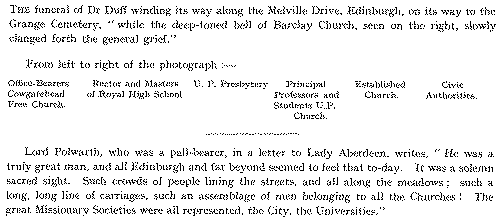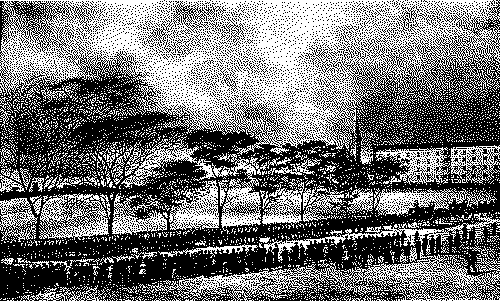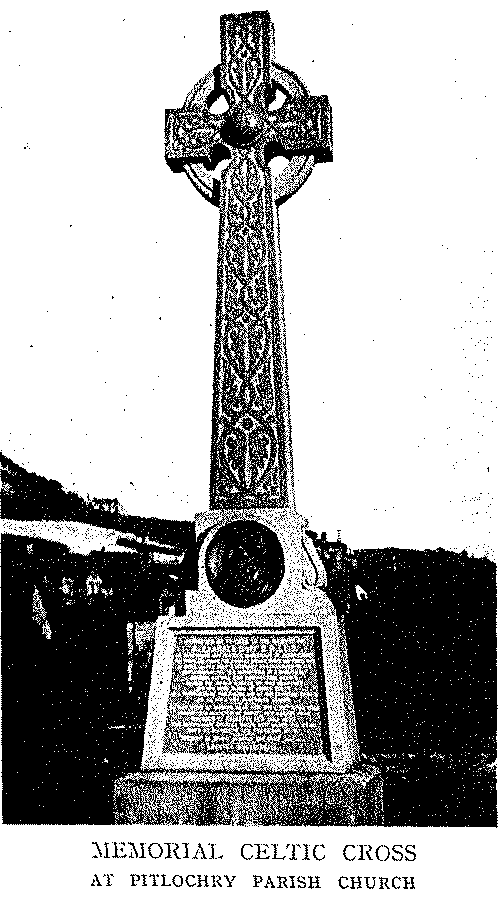FRAGILE though he was at the time of his
wife's death, Dr Duff pressed into the remaining thirteen years of his
life, unless towards the close, an astounding amount of radiant and
varied activity. The lectures he prepared for his Chair he delivered
every winter not only in Edinburgh but also in Glasgow and Aberdeen.
Yet, as set forth in Dr George Smith's biography, "he refused to touch
any income as professor or as Convener of fhe Foreign Missions
Committee, being content with the modest revenue from the Duff
Missionary Fund." The expansion of missions and the raising of funds
had his unflagging support; in organisation, interviewing,
corresponding and visiting he was unwearied. But necessarily the
periods of seclusion and rest were now longer—at Auchendennan, on Loch
Lomond, in the spring time, and at Paterdale, in the English Lake
district, in the summer season.
Though
Duff was naturally of a sociable disposition his work so absorbed his
attention that relatives, some of whom generally
resided with him, saw little of him. He appeared punctually at
breakfast, thereafter conducted family worship, gave a brief glance at
the daily paper, disappeared into his study or left for the offices of
the Church or the New College. At luncheon time he appeared, took his
share in the conversation, and then retired once more to his study.
After dinner, if not too busy, he would converse for a time, and,
unless friends were pending the evening, when he joined them in the
drawing room, as a rule he retired to his study till it was time for
family worship. He enjoyed the usual family gathering on Sunday
afternoon for the singing of. hymns, his favourite choice being "Guide
me, O Thou great Jehovah," or occasionally the hymn which had been Mrs
Duff's favourite, "Lo, He comes with clouds descending." When any of
the family was leaving home, the travellers' psalm, the one hundred
and twenty-first, was usually sung.
His generous desire to help
the needy made it difficult for him to refuse anyone who sought alms;
he would help anyone who begged from him as he walked home from the
College, as he could not endure the thought that he had refused to
help a really deserving case. The mendicant fraternity knew this
weakness, and, in spite of all precautions, some managed to gain
entrance to his study only to offer some article for sale which he
purchased in order to get rid of them.


His Second Moderatorship
In 1873 Dr Duff was, for the' second time,
proposed as Moderator of the •Free Church General Assembly. He
hesitated as to acceptance of the nomination, and what finally induced
him to consent was his desire to act as a factor, of conciliation
between those who had been working for Union with the United
Presbyterian Church, and the separatist minority who threatened to
secede if Union were carried. His addresses as Moderator of the
Assembly were, in essence, an appeal for harmony; his cry was "Cease
your petty strifes; Unite and fight against your one enemy." But the
fissure was not healed. As a compromise measure a "mutual eligibility"
proposal favoured by Dr Duff was carried, and this remained in force
till 1900 when the union of the two communions was effected, though at
the cost of a lamentable secession. Duff acted from the highest
motives, but the compromise had tended for the time being to intensify
rather than abate ecclesiastical partisanship. Thus it was that when,
on the death of Principal Candlish, Duff was nominated for the vacant
post he at first assented, but, finding later the state of division
which still existed between minority and majority, he withdrew,
leaving the way clear for the election of Dr Rainy, whose appointment
he heartily welcomed, presiding (in Dr Rainy's absence) at the first
meeting of the Senatus held thereafter.
Holidays Abroad
During his later years Dr Duff's health compelled
him to go abroad at various times. In 1870 he accompanied Dr Lumsden,
Principal of the New College, Aberdeen, on a tour in Syria—his second
in that region, where, as Convener of the Foreign Missions Committee,
he had formerly established a Mission. On one of his continental trips
he stayed at Neuenahr, on the Rhine, between Boun and Coblentz. One
day, while taking his usual walk, he came upon a boy who was fishing
from one of the bridges over the Ahr. On looking over the parapet the
doctor noticed that the bed of the stream had been paved, to prevent
the washing away of the foundations of the bridge. He saw that, as the
water rushed over the paving stones, nothing could be caught there.
Though ignorant of German, he made the boy understand this, and when
the line was lifted he saw to his surprise that the hook was not
baited. He then led the boy down the stream to what seemed a likelier
spot, hunted for a worm with which he baited the hook, and left the
boy fishing.
One year he
paid a visit to Norway, and according to custom drove his cariole,
but, as he gave more attention to the scenery than to driving, the
cariole was upset and he was thrown out and severely shaken. This,
however, did not prevent him from continuing his tour. On a later
occasion at Kingussie, the guard of the Laggan
coach, while adjusting the baggage, for some reason lost his temper
and used an oath. The doctor immediately seized the man's arm, and in
a voice full of emotion, his eyes brimming with tears, said: "Oh no,.
no, you don't mean that." The gentle rebuke had the desired effect.
The Last Days
Even his holiday excursions
were, however, a strain upon the veteran. He told a former colleague
he was the only man who knew that there was no moment of his life, by
day .or by night, in which he was free from the suffering of acute
pain, which sometimes increased to such intensity that it seemed too
great for endurance. "Ah well," he added, "it will not be for long."
But his endurance of pain was remarkable. A few years before his death
he refused to take chloroform while the surgeon removed a growth from
behind his ear, and after the operation was over came to the next
meal, with his head all bandaged, and sat through it as quietly as if
nothing had happened. One evening he fell heavily while taking a book
from one of the upper shelves in his library, and in falling drove in
the panel of an oak desk with his head. On recovering consciousness,
though in acute pain, as it was nearly the hour for family worship, he
sat down in his chair, then came into the dining-room and conducted
worship as usual. After prayers he seemed unusually anxious that his
two grandchildren who were present should retire to bed, and then
asked his daughter to see if there was anything wrong with the back of
his head. When she saw the severe wound she wished to summon medical
aid at once, but to this he would not consent, and only allowed it to
be done about ten o'clock next morning when a cab came which had been
ordered to take him to the Assembly. As soon as convalescent he left
Edinburgh with a male nurse, at the earnest request of the doctor and
his relations; two days later the nurse returned, having been paid
off.

A second visit was paid to
Neuenahr from which he derived no benefit, but he was with difficulty
restrained even then in his feeble health from travelling home by the
Moselle which he wished his grandson to see. Autumn found him still
losing ground, and by medical advice he went to Sidmouth. He rose each
day and lay upon the couch, as he would not remain in bed, and refused
nursing help till he was too weak to rise. Though utterly weary, he
was bright with hope of recovery, and remained clear in his mind till
a day or two before his death. On Sunday morning he responded with the
words" Blessed truth," to the verses in Peter which run: "Blessed be
the God and Father of our Lord." The earth gradually faded, as the
wearied but rejoicing servant passed on the morning of Tuesday, 12th
February 1878, to meet the King he had so loyally served.
The news of the great
missionary's death sent a wave of sadness all over the world, and
moving tributes to Dr Duff's memory came from far and. near, Mr
Gladstone describing the departed saint as one who stood in the first
rank of those heroic and apostolic men who had given themselves up to
the holy cause of missions. In the funeral procession to the Grange
Cemetery in Edinburgh the municipalities of the country, the four
Universities, the Royal High School, all the Scottish Presbyterian
denominations, the English, American and Indian Churches, and all
classes of the people were represented. The grave in the Grange
Cemetery has become to many a place of pilgrimage, as has also the
beautiful memorial Celtic Cross, with medallion bust portrait, at
Pitlochry Parish Church, which tells of the high plane. of life and
endeavour reached by one who began his great and marvellous career as
a boy in quiet, rural Moulin.

